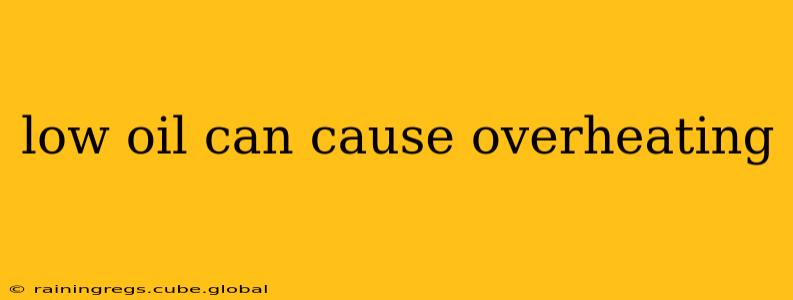Low engine oil levels are a serious problem that can lead to catastrophic engine failure. One of the most significant consequences of low oil is overheating. This isn't just a minor inconvenience; it can cause irreparable damage to your vehicle's engine. Understanding why low oil leads to overheating is crucial for preventative maintenance and avoiding costly repairs. This article will explore the relationship between low oil and overheating, providing you with the knowledge to protect your vehicle.
How Does Low Oil Cause Overheating?
Engine oil plays a vital role in lubricating and cooling the engine. It acts as a lubricant, reducing friction between moving parts and preventing wear and tear. Just as importantly, it acts as a coolant, absorbing heat generated during combustion and distributing it throughout the engine block. When oil levels are low, several factors contribute to overheating:
-
Reduced Lubrication: Low oil levels mean less lubrication, increasing friction between engine components. This increased friction generates excessive heat, raising engine temperatures beyond their safe operating range. Think of it like trying to rub your hands together vigorously – the more friction, the more heat is generated.
-
Insufficient Heat Dissipation: Oil is crucial for carrying away heat from vital engine parts. With low oil, this heat dissipation process is severely hampered. The engine components, unable to shed excess heat effectively, overheat rapidly.
-
Increased Wear and Tear: The heightened friction from reduced lubrication accelerates wear and tear on engine components. This can lead to further complications, exacerbating overheating and ultimately causing engine damage.
-
Oil Pump Issues: In some cases, low oil levels can lead to problems with the oil pump. The oil pump draws oil from the sump and distributes it throughout the engine. Insufficient oil can cause the pump to work harder, potentially leading to damage or failure. A malfunctioning oil pump further compromises the engine's ability to cool itself.
What are the Signs of Low Oil and Overheating?
Recognizing the symptoms early is critical to preventing major damage. Here are some key indicators:
- Temperature Gauge Rising: Your vehicle's temperature gauge will climb beyond the normal operating range.
- Overheating Warning Light: A flashing or illuminated overheating warning light on your dashboard is a serious warning.
- Steam or Smoke from the Engine: This could indicate coolant boiling over due to extreme heat.
- Knocking or Unusual Engine Sounds: These sounds often signal increased friction from low oil levels.
- Low Oil Pressure Warning Light: This light illuminates when oil pressure drops significantly.
What Happens if I Continue to Drive with Low Oil?
Continuing to drive with low oil levels will almost certainly lead to severe engine damage. This can include:
- Warped Cylinder Heads: Extreme heat can warp the cylinder heads, compromising the engine's ability to seal properly and leading to decreased performance and potentially catastrophic failure.
- Cracked Engine Block: Similar to warped cylinder heads, the engine block can crack under intense heat, necessitating a costly engine replacement.
- Seized Engine: Extreme friction caused by low oil can cause engine parts to seize, rendering the engine completely unusable.
How Can I Prevent Low Oil and Overheating?
Regular maintenance is key to preventing low oil and subsequent overheating. Here are some vital steps:
- Regular Oil Changes: Follow your vehicle's recommended oil change intervals.
- Check Your Oil Level Regularly: Use the dipstick to check your oil level at least once a month.
- Address Oil Leaks Immediately: If you notice any oil leaks, have them repaired as soon as possible.
- Use the Correct Type and Grade of Oil: Refer to your owner's manual for the recommended oil type and grade.
Can low coolant cause overheating?
Yes, low coolant levels are another frequent cause of engine overheating. Coolant plays a critical role in regulating engine temperature, and insufficient coolant means the engine is less capable of shedding heat. Low coolant should be addressed as quickly as possible, just like low oil. Often, a leak in the cooling system is responsible for low coolant.
Can low oil pressure cause overheating?
Yes, low oil pressure can directly contribute to overheating. When oil pressure is low, the oil doesn't circulate effectively, leading to inadequate lubrication and cooling. This reduced lubrication increases friction and heat build-up, resulting in overheating.
What are the consequences of driving with low oil?
Driving with low oil is extremely detrimental to your engine. As discussed above, the consequences range from increased wear and tear to catastrophic engine failure, resulting in costly repairs or even a complete engine replacement.
By understanding the crucial connection between low oil and overheating, and by practicing diligent preventative maintenance, you can significantly reduce the risk of engine damage and ensure the longevity of your vehicle. Remember, regular oil checks and timely maintenance are far more cost-effective than dealing with major engine repairs.
